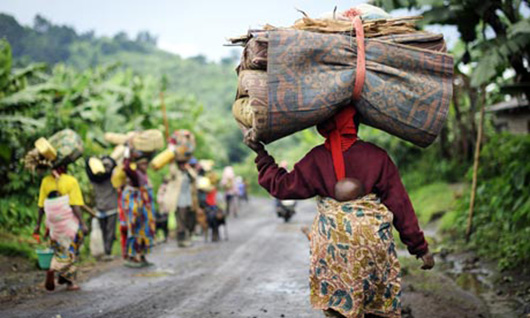St Andrews hosts Congo emergency summit

William Hague and Angelina Jolie’s trip to the Congo last week brought endemic sexual violence in the warzone to the world’s attention. Now rights groups, Congolese civil society organisations, academic researchers, and students are preparing to gather at the University of St Andrews (April 19-20, 2013) to discuss the challenge of moving forward.
Among them will be:
- Dr Gérard Prunier, one of the foremost Africanists in the world today;
- Fiona Lloyd-Davies, award-winning foreign documentary and current affairs journalist;
- Koen Vlassenroot, Director of the Conflict Research Group and Professor at the University of Ghent;
- Mr Bandi Mbubi, Founder of Congo Calling
- And Marie-Therese Nlandu, attorney and former Amnesty International ‘Prisoner of Conscience’.
The conference, ‘Looking Forward in the Eastern DRC: The Roles to be Played by the International Community’, will be a once in a generation opportunity to gather some of the people with the greatest contribution to make to forming policy in relation to one of the most environmentally, economically, socially, and politically diverse and significant regions in the world – and to hear them discuss how progress can be made.
Since 1998, it is estimated that over 6 million people have died in the Democratic Republic of the Congo where multitudes of armed groups use guns and rape as weapons of war. The trade of minerals that are required to make electronics such as mobile phones, laptops, and mp3 players is fuelling and worsening this complex crisis.
Anyone with an interest in politics, sustainable development, women’s rights, human trafficking, microfinance, or just making the world a better place is encouraged to attend the conference.
“It’s often we speak about the dramas and the pain and horrors of the Congo, but it’s also a wonderful place with extraordinary people,” Angelina said in a new video released by The Guardian.
She went on to say: “We want to persuade governments around the world to give this issue the attention it deserves.”
Angelina Jolie and William Hague have highlighted the widespread use of sexual violence, while other rights groups and academics have focused on trade of conflict minerals, the increasing amount of rebel groups in the region, security sector reform, and the direct role of external state actors such as Rwanda. However, the approaches to resolving these key issues are varied and inconclusive.
Now the St Andrews conference hopes to begin to discuss collaborative efforts, assess collective goals regarding advocacy and civil society engagement; and provide a platform for academic research on stability and development in the eastern Democratic Republic of Congo.
Professor Mario Aguilar, Director of the Centre for the Study of Religion and Politics, said:
“This is the largest conference on the DRC to take place in the UK and will have a considerable impact on future academic and political conversations on the region. Combining issues of religion and politics it consolidates years of teaching and research about the DRC in St. Andrews”.
Fourth year International Relations student, and Director of the Coalition for a Conflict-Free St Andrews, Bennett Collins said:
“What makes this event so unique is that, while St Andrews University is so well known for being at the head of terrorism studies, this conference will show our academic community is just as innovative when it comes to Sub-Saharan Africa and the promotion of human rights.”
Notes to News Editors
Tickets for the conference cost £10 for Dr Gerard Prunier’s Friday evening keynote speech, or £25 for the full weekend, and are available at: http://conflictfreestandrews.org/conference-2013/ticket-sales/
A full timetable of presentations, panels and speeches is available at: http://conflictfreestandrews.org/conference-2013/schedule/
Organised by the Coalition for a Conflict-Free St Andrews and the University of St Andrews’ Centre for the Study of Religion and Politics; the event is sponsored by Christian Aid, St Andrews’ Student Association, and the University of St Andrews’ Centre for Peace and Conflict Studies, School of Anthropology, and School of International Relations.
The Coalition for a Conflict-Free St Andrews is composed of 15 student societies at the University of St Andrews that have come together to raise awareness of and advocate for the end of the elicit extraction and trade of conflict minerals.
The conference is part of the University’s series of 600th Anniversary events, showcasing the University’s world-renowned academic strengths and contribution to matters of global concern.
Category Research